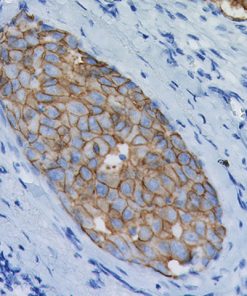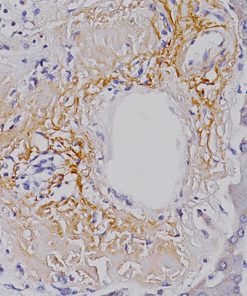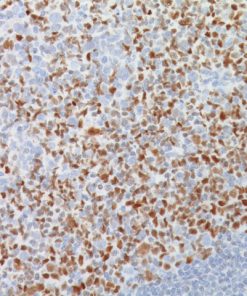Description
Product Description
Achaete-scute complex homolog-1 (ASCL1), known as mASH1 in rodents and hASH1 in humans, is a basic helix-loop-helix transcription factor that is critical for neuroendocrine cell differentiation (1,2). Neuroendocrine carcinomas can arise in different sites such as lung, the gastrointestinal tract, prostate and skin (2). High grade, poorly differentiated neuroendocrine carcinomas are classified as neuroendocrine carcinomas (NECs) and are distinguished from low grade neuroendocrine tumors (NETs) (2,3). Classic neuroendocrine markers such as chromogranin and CD56 cannot distinguish NECs from NETs (2). Studies have shown that the mouse monoclonal antibody MASH1 [24B72D11.1] stains hASH1 in human tissues and can distinguish NECs from NETs in various sites (3-5). MASH1 has also been shown to distinguish large cell neuroendocrine carcinomas (LCNECs) and small cell lung carcinomas (SCLCs) from other phenotypes of lung cancer (3-5). MASH1 has also been used to differentiate SCLC from Merkel cell carcinoma (6). While not a tissue-specific marker, MASH1 may assist in distinguishing neuroendocrine carcinomas from neuroendocrine tumors in poorly differentiated cases (2).
Specifications
Specifications
| Intended Use | |
|---|---|
| Format | |
| Volume | |
| Source | |
| Clone | |
| Isotype | |
| Antigen | |
| Localization | |
| Positive Control | |
| Species Reactivity |
Datasheets & SDS
| Download Data Sheet |
| SDS Sheet |
Browse more documents for this product (IFUs, datasheets, translations, SDS, and more).
References
1. Ball DW, et al. Identification of a human achaete-scute homolog highly expressed in neuroendocrine tumors. Proc Natl Acad Sci U S A. 1993 Jun 15; 90(12):5648-52.
2. La Rosa S, et al. Achaete-scute homolog 1 as a marker of poorly differentiated neuroendocrine carcinomas of different sites: a validation study using immunohistochemistry and quantitative realtime polymerase chain reaction on 335 cases. Hum Pathol. 2013 Jul; 44(7):1391-9.
3. Schnabel PA, Junker K. Neuroendocrine tumors of the lungs: From small cell lung carcinoma to diffuse idiopathic pulmonary neuroendocrine cell hyperplasia. Pathologe. 2014 Nov; 35(6):557-64.
4. Hiroshima K, et al. Distinction of pulmonary large cell neuroendocrine carcinoma from small cell lung carcinoma: a morphological, immunohistochemical, and molecular analysis. Mod Pathol. 2006 Oct; 19(10):1358-68.
5. Jiang SX, et al. hASH1 expression is closely correlated with endocrine phenotype and differentiation extent in pulmonary neuroendocrine tumors. Mod Pathol. 2004 Feb; 17(2):222-9.
6. Ralston J, Chiriboga L, Nonaka D. MASH1: a useful marker in differentiating pulmonary small cell carcinoma from Merkel cell carcinoma. Mod Pathol. 2008 Nov; 21(11):1357-62.
7. Center for Disease Control Manual. Guide: Safety Management, NO. CDC-22, Atlanta, GA. April 30, 1976 “Decontamination of Laboratory Sink Drains to Remove Azide Salts.”
8. Clinical and Laboratory Standards Institute (CLSI). Protection of Laboratory Workers from Occupationally Acquired Infections; Approved Guideline-Fourth Edition CLSI document M29-A4 Wayne, PA 2014.




![(L) Anaplastic large cell lymphoma and (R) Lung adenocarcinoma stained with ALK antibody [5A4]](https://biocare.net/wp-content/uploads/3041-247x296.jpg)

